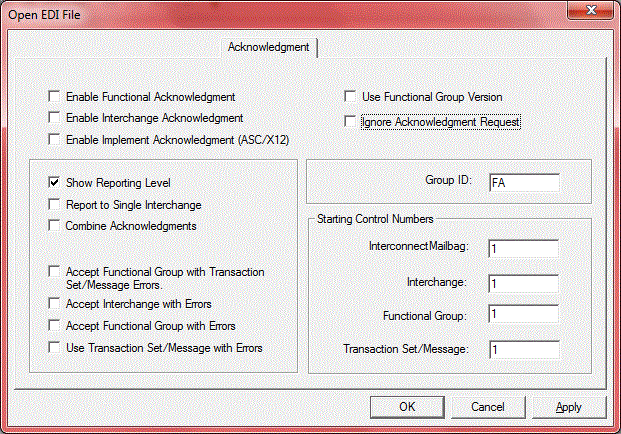The Acknowledgment tab contain optional settings to
control the generation of an acknowledgment when the EDI document is read.
-
The following is displayed:

-
Enter or select the following optional features:
-
Enable Functional Acknowledgment. Check this option
if the Functional Acknowledgment is to be generated. Setting this option
alone does not generate the acknowledgment -- both this option and specifying
the implementation guideline for the Functional Acknowledgment (997)
Transaction Set for ASC/X12, or CONTRL Message for UN/EDIFACT are required.
-
Enable Interchange Acknowledgment. Check this
option if the Interchange Acknowledgment is to be generated.
-
Enable Implement Acknowledgment. Check this
option if the Implementation Acknowledgment is to be
generated. This applies only to ASC/X12, and
the implementation guideline must contain the
Implementation Acknowledgment (999) Transaction
Set. Otherwise, no acknowledgment is
generated. For UN/EDIFACT, this check is
ignored.
-
Use Functional Group Version. If this option is not
checked, the subject document is verified for correctness using the schema
selected by the version specified in the interchange header. If this
option is checked, the version specified in the functional group is used
instead .
-
Ignore Acknowledgment Request. If this option is
checked, ignores the Acknowledgment Request data element value in the
Interchange Header control segment.
-
In ASC/X12, the data element identifier containing this value is
I13. The Acknowledgment Request determines whether an interchange
acknowledgment is generated for the subject document. By default, if the value
is "1" the acknowledgment is generated, otherwise if the value is "0" the
acknowledgment is not generated.
-
In UN/EDIFACT the data element identifier that requests the
Interchange Acknowledgment is 0031. The Acknowledgment Request determines
whether the CONTRL acknowledgment is generated for the subject document. If the
value is "1" the acknowledgment is generated otherwise if the value is "0" the
acknowledgment is not generated.
-
Show Reporting Level. Applicable to ASC/X12
only. Check this option to show the AK2/AK5 (Transaction Set level) in
the acknowledgment file that is being generated if there is no syntactical
error recorded in the AK2/AK5 level.
-
Report to Single Interchange. Check this option to
report syntactical errors to an acknowledgment containing a single
interchange. If this option is not checked, and the subject document
contains more than one interchange, then separate corresponding interchanges
will be created in the acknowledgment document.
-
Combine Acknowledgments.
Applicable to ASC/X12
only. If this option is checked, combines the
Interchange Acknowledgment
(TA1), the Functional Acknowledgment (997) and
the Implementation Acknowledgment (999) into a single interchange in the
acknowledgment document. If the option is disabled, the TA1 acknowledgment is
enveloped in its own interchange, and separated from the interchange that
envelopes the 997 acknowledgment, and/or the 999
acknowledgment.
-
Accept Functional Group with Transaction Set/Message Errors.
If this option is checked, accepts the Functional Group if some of the
Transaction Sets (X12) or Message (EDIFACT) are not accepted because of
errors. Otherwise the Functional Group is either rejected, or accepted
with errors, depending on the whether the option Accept Functional Group
with Errors is check or not. Note that if all the underlying
transaction sets/messages are rejected, then the Functional Group is rejected
even if this option has been checked.
-
Accept Interchange with Errors. If this option is
checked, accepts the Interchange even if errors are found in the interchange
header and trailer data segments.
-
Accept Functional Group with Errors. If this option is checked,
accepts the Functional Group even if all underlying Transaction Sets (X12) or
Message (EDIFACT) are rejected.
-
Use Transaction Set/Message with Errors. If this
option is checked, accepts the Transaction Set (X12) or Message (EDIFACT) even
if there are underlying errors reported.
-
Group ID. Applicable to ASC/X12 only. Assign
the value of the Functional Group ID. When the acknowledgment is
generated, the Functional Group ID is stored in the Functional Identifier Code
data element in the AK1 data segment.
-
Starting Control Numbers:
-
InterconnectMailbag. Starting control number of the
first Interconnect Mailbag in the acknowledgment.
-
Interchange. Starting control number of the first
Interchange within the acknowledgment document or within an Interconnect
Mailbag.
-
Functional Group. Starting control number of the
first Functional Group in an Interchange.
-
Transaction Set/Message. Starting control number of
the first Transaction Set/Message in a Functional Group or Interchange.
NOTE: All options are applicable only if the options Enable Functional Acknowledgment and/or
Enable Interchange Acknowledgment are checked.
-
Press OK or Apply to save the settings.